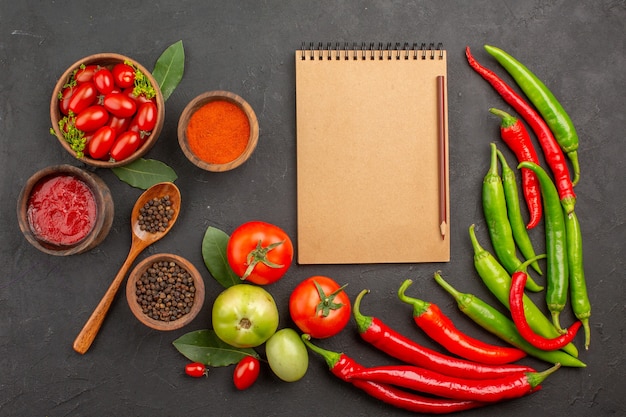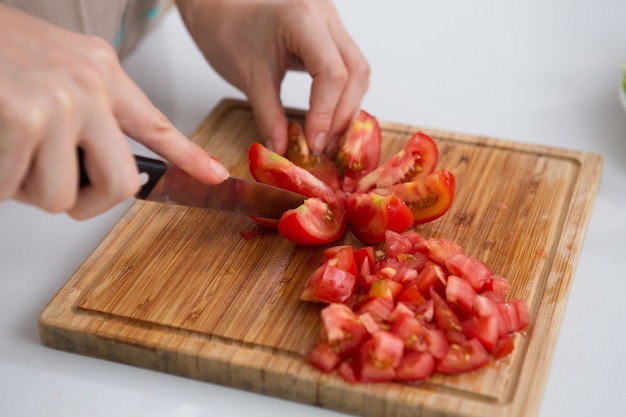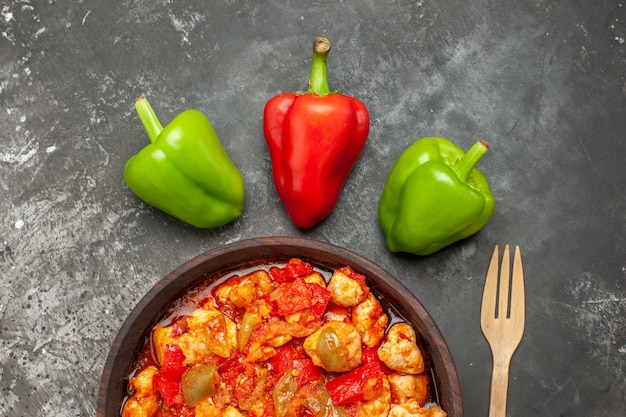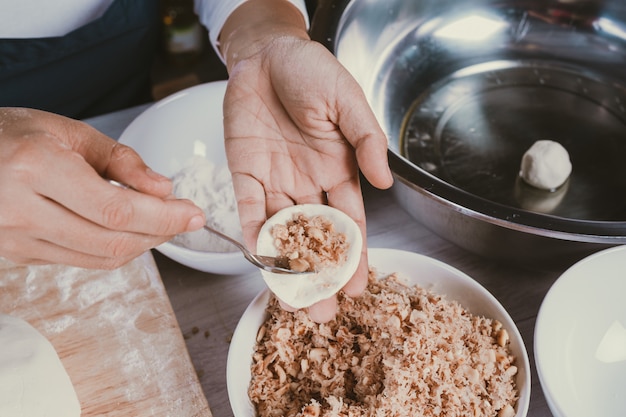Let's talk chili, the kind that sends a comforting warmth through you, leaving you wanting more with every spoonful. Not the watery, canned stuff, but the real deal, a symphony of flavours and textures that you'll dream about long after the last bite.
I've been making chili for years, and I've learned a thing or two along the way. I've had my share of disasters, like that time I went wild with exotic spices, ending up with something that tasted like a confused curry. And then there was the incident with the cayenne pepper – let's just say everyone had a fiery night.
But through trial and error, I've finally cracked the code to the ultimate chili. It's a perfect balance of flavour, texture, and heat, and incredibly versatile. You can tailor it to your liking, experimenting with different beans, meats, or spices. Even a complete beginner can whip up a delicious pot in no time.
So, whether you're a chili connoisseur or just starting out, this recipe is going to become your go-to for those cozy evenings. Let's get started!
Part 1: The Foundation – Building Blocks for a Stellar Chili

1.1 The Meat of the Matter: Choosing Your Base
Any great chili starts with a solid foundation, and that means choosing the right meat. For me, nothing beats a hearty beef chili. I usually go for chuck roast or short ribs, they're bursting with flavour and hold up beautifully to long cooking. But feel free to get adventurous! pork shoulder adds a delightful richness, and a combination of beef and pork creates a flavour explosion.
If you're after a leaner option, ground beef is always a reliable choice. Just ensure you brown it thoroughly before adding it to the chili pot.
1.2 Bean Bliss: A Symphony of Textures and Flavors
Beans are the backbone of a good chili, adding heartiness, texture, and a depth of flavour. My favourites are kidney beans and pinto beans – they're versatile and hold their own during the long simmering process. But don't be afraid to shake things up! black beans bring a smoky edge, chickpeas offer a nutty touch, and even lentils can surprise you with their unique flavour.
1.3 The Spice Rack: Unleashing the Chili's Character
Here's where you can really make your chili sing! For me, a combination of chili powder, cumin, oregano, and paprika hits all the right notes. These spices deliver a deep, earthy flavour that's perfect for chili. But if you want to add a touch of heat, sprinkle in some cayenne pepper or chipotle powder.
Remember, experimentation is key. A pinch of smoked paprika adds a smoky depth, while garlic powder adds a punch. Chili is all about personal preference, so play around with spices until you find your perfect blend.
Part 2: The Art of slow cooking – Cultivating Depth of Flavor

This is where the real magic happens. The secret to a truly outstanding chili lies in slow cooking, allowing the flavours to meld and the meat to become incredibly tender.
2.1 Slow and Steady Wins the Race
My go-to method is the slow cooker. Simply add all the ingredients, set it on low, and let it simmer for 6-8 hours. The result? A chili that melts in your mouth, a symphony of flavour.
If you don't have a slow cooker, a dutch oven on the stovetop works wonders. Bring it to a simmer, reduce the heat, and cook for at least 2 hours, stirring occasionally.
2.2 Liquid Love: The Broth that Makes it Sing
The liquid you use is crucial. I like to combine beef broth with tomato juice. The beef broth adds a richness and depth, while the tomato juice brings a touch of sweetness and acidity, creating a beautiful balance.
You can also use chicken broth or even water, but I find that beef broth or a combination of beef broth and tomato juice delivers the best flavour.
Part 3: Texture Time – Achieving the Perfect Consistency

3.1 Mastering the Mix
A good chili should have a nice, hearty consistency, neither watery nor overly thick. It should be just right, like a warm hug on a chilly evening.
If your chili is too thin, thicken it with a cornstarch slurry. Mix a tablespoon of cornstarch with 2 tablespoons of cold water, whisk it in, and simmer for a few minutes until it thickens.
If your chili is too thick, add a bit more broth and simmer gently until it reaches the desired consistency.
3.2 The Power of Patience
Remember, patience is key. Let the flavours meld and the meat become tender before adding any thickeners or thinners. You can always adjust the consistency later on.
Part 4: The Finishing Touches – Adding That Extra Je Ne Sais Quoi
Now, onto the fun part – the finishing touches. This is your chance to personalize your chili and make it truly your own.
4.1 The Spice Factor
If you like things hot, sprinkle in some cayenne pepper or chipotle powder. A few chopped jalape??os or a dash of hot sauce will add an extra kick.
4.2 A Touch of Sweetness
For a touch of sweetness, add a tablespoon or two of brown sugar or molasses. This will balance out the spice and add another layer of flavour to your chili.
4.3 The Garnish Game
And finally, the garnish! I love a dollop of sour cream, some shredded cheddar cheese, and a sprinkle of chopped cilantro. But don't be afraid to experiment. Chopped onions, diced tomatoes, even a fried egg can add a delightful twist.
Part 5: Serving Up Success – The Perfect Chili Experience
Your chili is ready, so let's get it served! I like to serve mine in bowls with a side of cornbread – the perfect combination of hearty and comforting.
And of course, no chili night is complete without a cold beer or a glass of red wine.
Part 6: Variations on a Theme – Exploring Chili's Versatility
There are endless possibilities when it comes to chili, so don't be afraid to get creative and experiment.
6.1 White Chili
White chili is a delicious variation using white beans instead of red beans. It's typically made with chicken or pork, and often includes ingredients like corn, green chilies, and cumin, creating a lighter, brighter flavour profile.
6.2 vegetarian chili
For a meatless option, there are tons of delicious vegetarian chili recipes. Use lentils, black beans, or chickpeas as your base, and add in vegetables like onions, peppers, carrots, and celery.
6.3 Chili with a Twist
For a unique twist, try adding some chocolate to your chili. It may sound odd, but the chocolate adds a touch of sweetness and richness that complements the spices perfectly. It's a surprising and delicious combination that's worth trying.
Part 7: Storing and Freezing – Making the Most of Your Chili
Leftover chili is a delicious way to have a quick and easy meal. Here's how to store and freeze your chili so it stays fresh and flavorful.
7.1 Refrigerator Ready
To store in the refrigerator, transfer it to an airtight container and refrigerate for up to 4 days.
7.2 Freezing for Later
For freezing, let it cool completely, then transfer to freezer-safe containers or bags. It can be frozen for up to 3 months. When ready to eat, thaw in the refrigerator overnight and reheat on the stovetop.
Part 8: Ultimate Chili Recipe
Alright, let's get down to the nitty-gritty! Here's my ultimate chili recipe.
8.1 Ingredients
- 1 tablespoon olive oil
- 1 onion, chopped
- 2 cloves garlic, minced
- 1 pound ground beef
- 1 (15-ounce) can diced tomatoes, undrained
- 1 (15-ounce) can kidney beans, drained and rinsed
- 1 (15-ounce) can pinto beans, drained and rinsed
- 1 teaspoon chili powder
- 1 teaspoon cumin
- 1 teaspoon oregano
- 1/2 teaspoon paprika
- 1/4 teaspoon cayenne pepper (optional)
- 1 cup beef broth
- 1/2 cup tomato juice
- Salt and pepper to taste
8.2 Instructions
- Heat the olive oil in a large pot over medium heat. Add the onion and cook until softened, about 5 minutes.
- Add the garlic and cook for 1 minute more.
- Add the ground beef and cook, breaking it up with a spoon, until browned. Drain off any excess fat.
- Stir in the diced tomatoes, kidney beans, pinto beans, chili powder, cumin, oregano, paprika, and cayenne pepper (if using).
- Add the beef broth and tomato juice. Bring to a boil, then reduce heat and simmer for 30 minutes, stirring occasionally.
- Season with salt and pepper to taste.
- Serve hot with your favorite toppings.
Part 9: Variations
Here are a few ideas to make your chili truly unique.
- Beef and bean chili: Use a combination of ground beef, chuck roast, or short ribs, and add your favourite beans.
- Pork Chili: Use pork shoulder instead of ground beef and add in spices like smoked paprika and cumin. The pork will add a touch of sweetness and a deeper flavour.
- Vegetarian Chili: Use lentils, black beans, or chickpeas as your base, and add in vegetables like onions, peppers, carrots, and celery. You can also try different vegetable combinations for a unique flavor profile.
- White Chili: Use white beans instead of red beans, and add in ingredients like corn, green chilies, and cumin. This will give your chili a lighter and more refreshing flavour.
- Spicy Chili: Add more cayenne pepper or chipotle powder for a fiery kick. Adjust the amount to your preference.
- Sweet Chili: Add a tablespoon or two of brown sugar or molasses for a touch of sweetness. This will balance out the spiciness and add a layer of depth to your chili.
Part 10: Serving Suggestions – Elevate Your Chili Experience
Here are some ideas to make your chili even more delicious.
- Cornbread: A classic pairing that adds a touch of sweetness and a satisfying crunch.
- Rice: A hearty and filling side dish that complements the chili beautifully.
- Sour Cream and Cheese: Classic toppings that add a creamy richness and a touch of tang.
- Chopped Onions and Cilantro: Add a fresh and flavorful touch that balances the hearty flavours of the chili.
- Avocado: A creamy and healthy topping that adds a richness and a touch of healthy fats.
Part 11: Tips and Tricks – Mastering the Art of Chili
Here are a few tips to help you make the best chili ever.
- Use a slow cooker for the best results. The slow cooker allows the flavours to meld and the meat to become incredibly tender, resulting in a truly delicious chili.
- Don't be afraid to experiment with different spices and beans. Chili is very versatile, so make it your own!
- Let the chili simmer for at least 30 minutes to allow the flavors to develop. The longer it simmers, the more intense and complex the flavours become.
- Taste the chili and adjust the seasonings as needed. This is crucial to ensure that your chili is perfectly seasoned to your liking.
- Serve the chili hot with your favorite toppings. Top it off with your favourite toppings for a personalized and delicious experience.
Part 12: FAQs – Answers to Your Chili Questions
Here are some frequently asked questions about chili.
12.1 What is the best type of meat to use for chili?
The best type of meat for chili is a cut that is full of flavor and holds up well to long cooking times. Beef chuck roast, short ribs, and ground beef are all good choices. You can also use pork shoulder or a combination of different meats.
12.2 What are the best beans to use for chili?
The best beans for chili are kidney beans, pinto beans, and black beans. These beans are versatile and hold up well to long cooking times. You can also use other beans, such as chickpeas and lentils, to add different flavors and textures to your chili.
12.3 What spices should I use in my chili?
The most common spices used in chili are chili powder, cumin, oregano, and paprika. You can also use other spices, such as cayenne pepper, chipotle powder, smoked paprika, and garlic powder. Experiment with different spices to find your own favorite combination.
12.4 How long should I cook chili for?
Chili should be cooked for at least 30 minutes, and up to 8 hours in a slow cooker. The longer you cook the chili, the more flavorful it will be.
12.5 Can I freeze chili?
Yes, you can freeze chili. Let the chili cool completely, then transfer it to freezer-safe containers or bags. It can be frozen for up to 3 months. When ready to eat, thaw in the refrigerator overnight and reheat on the stovetop.
I hope this ultimate chili recipe inspires you to get into the kitchen and create your own culinary masterpiece. Happy cooking! And don't forget to share your creations!
Everyone is watching

How to Cook Frozen Lobster Tails Perfectly: A Step-by-Step Guide
RecipesLobster. Just the word conjures up images of lavish meals, special occasions, and a taste of luxury. But let's...

Pigs in a Blanket Cooking Time: How Long to Bake for Perfect Results
RecipesAh, pigs in a blanket. Just the name conjures up images of those delightful little parcels of crispy pastry en...

Pork Fillet Cooking Time: How Long to Cook It Perfectly
RecipesPork fillet, or tenderloin as it's sometimes called, is a real favourite in our house. It's so versatile, and...

The Ultimate Guide to Tender, Juicy Pulled Pork
RecipesRight, let's talk pulled pork. It's one of those dishes that just screams "comfort food," doesn't it? I mean...

The Ultimate Guide to Cooking Sweet Potatoes: From Roasting to Mashing
RecipesSweet potatoes. Just the name conjures up images of warm, comforting dishes, bursts of vibrant color, and a to...
